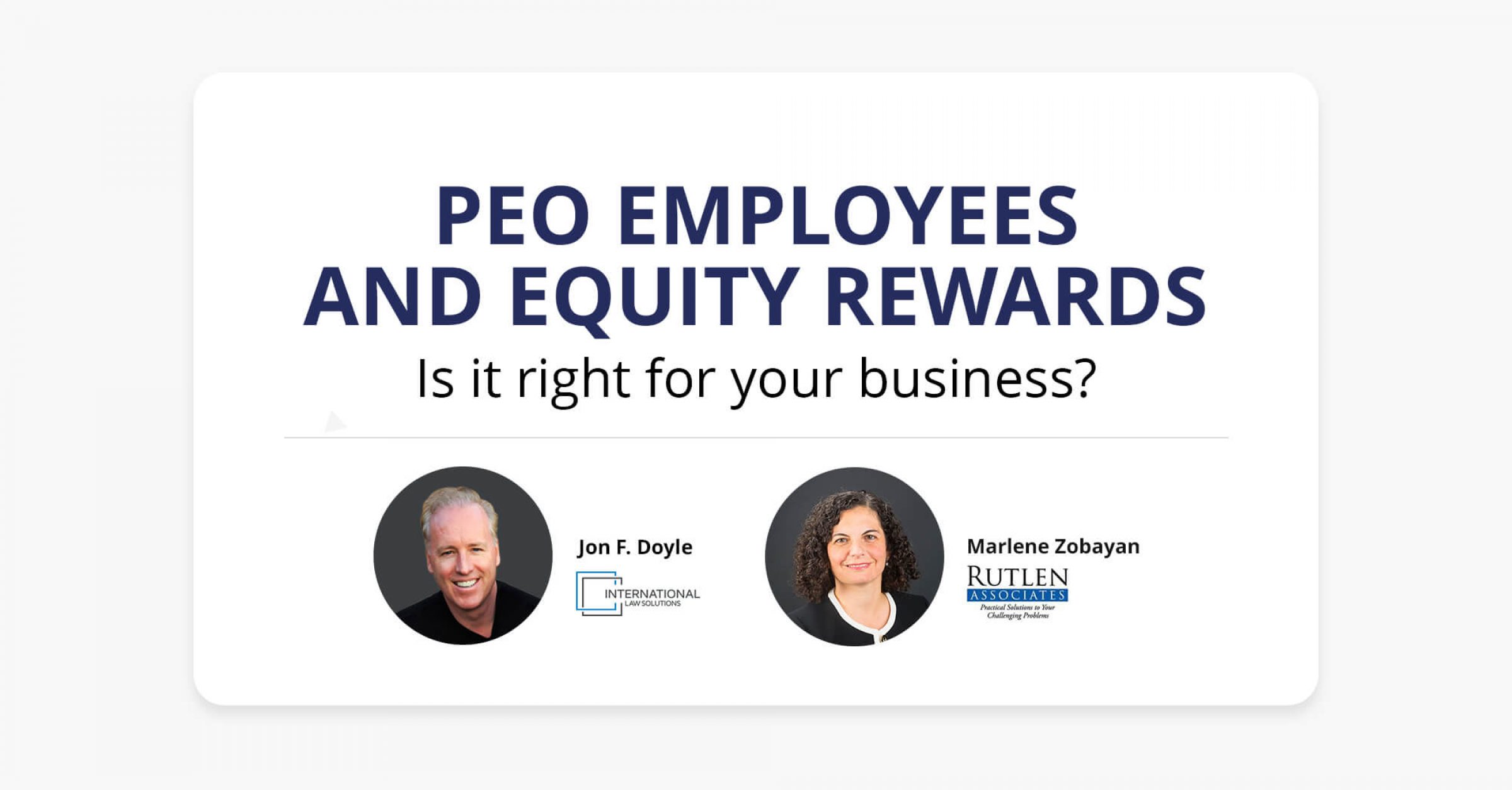Linking up with a Professional Employment Organization (PEO) can make sense for companies looking to recruit talent in a country where they may not have a formal presence. Before proceeding, however, companies need to be clear on whether it is the right move for their specific needs and it is important to be aware of the complexities that may arise down the line when it comes to equity awards and PEO employees.
What is a PEO?
First things first, let’s be clear on what exactly we’re talking about. A PEO is a human resources outsourcing entity that can enter into a formal business arrangement with another company to co-employ individuals. In many instances, the purpose of the exercise may be to reduce the administrative burden for growing businesses. The services offered by PEOs can include handling payroll-related matters, benefits administration, retirement planning, compliance with relevant legislation, and filing taxes in a timely manner. Part of the appeal of PEOs is that they can allow small and medium-sized companies to remain focused on building the business rather than becoming bogged down in attending to an ever-increasing admin-related burden.
However, it is important to note that not all PEOs offer an identical list of services. Some may provide the full menu of HR-related activities, while others may be more selective in the tasks that they undertake. It is therefore vital that you be clear on whether a PEO you are considering entering into an agreement with is willing to carry out the tasks you need done.
Initial considerations
On a recent episode of our Own Up podcast, global stock plan expert and partner at Rutland Associated, Marlene Zobayan, and Jon Doyle, managing shareholder, International Law Solutions, took a deep dive into the PEO topic, and during the course of that discussion addressed some of the key points they consider companies looking to work with a PEO should educate themselves on.
At the outset, Jon explained that his legal firm typically becomes involved when clients decide they want to offer equity to someone new or people in certain countries and reach out seeking advice on the tax and regulatory implications.
“The first things we will want to understand are what type of equity are they offering, what countries are they offering it in, and what type of workers are getting the awards? Are they employees of a subsidiary or affiliate? Are they contractors? Or are they with a third party such as a PEO?” he said.
These questions should be addressed as early in the process as possible, as the answers will define what type of arrangement it is going to be, and will impact directly on what companies can expect in terms of their tax and regulatory obligations in specific parts of the world.
Depending upon the country, the regulatory rules will differ, and in some instances this can serve to make PEOs more attractive to companies.
As Jon explained: “Some countries around the world are really skeptical about or just don’t like contract arrangements. Frequently, clients will come to us wanting to use a contractor, but the issue becomes taxes. If the individual doesn’t pay the taxes, then there’s a risk to the company. And it’s for that reason that a lot of folks use these PEO arrangements.”
Potential Pitfalls
On the point of tax, Marlene stated that some authorities are still trying to catch up with the reality of cross-border PEO employees and that this creates potential pitfalls for companies.
“It’s over the last three years or so that we’ve seen the largest amount of PEO employee growth, and during that time tax authorities have had to deal with remote workers and what to do when people are stuck in one location, as we saw with the Covid pandemic. So, they really haven’t had a chance to even get their arms around it, and maybe I’m being a bit generous when I put it that way,” she said.
Marlene went on to explain that whereas legal experts such as Jon usually hear from clients at the outset, people in her role are usually contacted later in the process, at a time when the situation may have become somewhat complex.
“I tend to be the one that gets the calls when an employer company says, ‘We have an employee that we’ve given equity to and now he wants to exercise his stock options, so how do we withhold?’ And you then are faced with trying to unravel a situation they went into, and by then it may be too late,” she said.
She went on to highlight some of the tax issues that can come up in this scenario:
· Is there a withholding and reporting liability for payroll compliance?
· Who is responsible for dealing with whatever liability may exist – the PEO or the company?
The answers to these questions will vary from country to country and depend on what the PEO is willing to do.
Marlene highlighted how in some countries the issuer is the one deemed liable, even if they are not a resident company. In that scenario, the PEO, who will have a formal presence in the relevant location, may be able to step in and meet the requirement as she explains.
“The issue is will the PEO want to do that withholding and reporting and very often they do not. And that’s why it’s critical in advance of making any grants to PEO employees that a company has that conversation with a PEO. And it doesn’t just end with withholding and reporting. Depending on where we’re talking about, there may be other compliance requirements,” she said.
Learn more
Against the backdrop of potential complications such as those referred to above, Jon added that sometimes using a PEO is the logical thing to do if a company wants to secure key talent in a country where they don’t have an established presence, but depending upon how things evolve over time, they may eventually choose to go on a formal footing in that jurisdiction.
“I look at PEOs and think their best use is as a way to quickly get people on board, but many companies will eventually look to set up their own arrangement. A lot of the time a client will say we’ve identified the perfect person, but we’ve got to move fast. If you then look to set up a subsidiary, that will not be fast, and so you’ll likely lose that person. So, that’s where a PEO can be really helpful. Then, if the client at some point gets sufficient people in that country or region, a lot of the time we will then help them to form a local subsidiary,” he said.
To hear the full conversation, check out the Global Shares, a JP Morgan company, Own Up podcast here.
The information provided in this article is intended for informational and educational purposes only; it is not intended as an offer for any specific product or service. Rutland Associated and International Law Solutions are not affiliated with JPMorgan Chase & Co. The article contains the views of a J.P. Morgan employee, which may differ from the views of J.P. Morgan Chase & Co., its affiliates and employees. The views and strategies described may not be appropriate for everyone. Certain information was obtained from sources we believe are reliable, but we cannot verify the accuracy of the content and we accept no responsibility for any direct or consequential losses arising from its use. You should carefully consider your needs and objectives before making any decisions. For specific guidance on how this information should be applied to your situation, you should consult a qualified professional.
Please Note: This publication contains general information only and J.P. Morgan Workplace Solutions is not, through this article, issuing any advice, be it legal, financial, tax-related, business-related, professional or other. J.P. Morgan Workplace Solutions’ Insights is not a substitute for professional advice and should not be used as such. J.P. Morgan Workplace Solutions does not assume any liability for reliance on the information provided herein.



